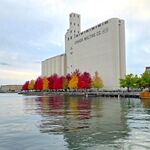urbanfan89
Active Member
I'd rather take a course on humour in Ancient Greek drama than on Canadian history, but that's another matter.
What does this even mean? Whose definition of 'Canadian', yours? Trust me, I've read your posts and you don't speak for me!
'Us Canadians'? You would circumscribe all Canadians as thinking the way you do yet criticize the PM for 'allegedly' doing the same?
To suggest that the Prime Minister and our government are somehow misstepping their bounds in dealing with the issue of absue of 'Canadian' citizenship is patently ludicrous.
On the contrary, he is protecting the 'rights' of citizens by clarifying them and addressing the abuse of them. Aside from the basic human rights of the Charter there are no citizenship 'rights' that do not come without responsibilities. That's the deal, the social contract we all agree to. It's nice to see this bargain being respected and enforced for all of us.
You're clearly missing the point though. It isn't about whether Canadian history is more interesting or not, they say "What, why are you studying about those Canadian things, you are (insert ethnic group) you should be studying this instead."
When I speak of "US" I am speaking of the Canadians who did not vote for this current disaster of a government led by Steve Harper. There are more of us than you.
Your head must be in the sand because there are Canadian Citizens not being protected abroad. The one in Cuba and the one in Africa come to mind. The Lebanon bombings told Canadians exactly where Harper stood on the issue. Hell, I imagine Harper would love to declare Iggy as a non-citizen if he could change the immigration laws to his liking and even that change would not save his ass as it has become an anyone but Harper issue now.
You speak of social contracts, what about the one that says we have a right to a fair trial? What about giving us documents to return home when we are falsely accused and imprisoned and tortured and place on meaningless lists by radical thinkers to our right?
I don't want to speak for you but at the same time I do know who I speak for.
you don't know who I am speaking about in Cuba and Africa?
you don't know who is not getting a fair trial in Cuba?
hint: they are both Canadian citizens. It is this government's policy not to intervene and the opposition disagrees strongly with Harper's position in both cases.
Harper wins a minority government but attempts to act like he has majority power, I fine that to be disturbing and not as it should be. This has been a public topic discussed by opposition and several news pundits.
If the opposition is that opposed to Harper as you suggest they can always bring down the house.
A little proroguing goes a long way.
In an interview in last week’s magazine, Jason Kenney, minister of citizenship, immigration and multiculturalism, ably defended his plans to strengthen the bonds of citizenship in Canada by encouraging immigrants to learn more of the history, values, and languages of our country.
Kenney, one of the bolder members of the Harper cabinet, objects to the notion of Canada as a hotel where people come and go with no abiding commitment to understanding and participating in our national life. He would add some rigour to our citizenship test; dump multicultural programs that subsidize cultural separateness; enhance the employability of newcomers through quicker recognition of foreign credentials.
Little to quarrel with there. The problem with Kenney’s initiative isn’t its substance but its limited application. The “massive civic illiteracy†Kenney identifies is just that: massive. It is a general problem, not an immigrant problem, and trying to address it through immigration policy risks turning a mostly worthwhile program into an adventure in scapegoating the newcomers.
How massive is our civic illiteracy?
For starters, Canadians can’t be bothered to vote. The last election recorded the lowest voter turnout in our history.
Nor do we understand how our government works. The various parliamentary and constitutional issues raised by the Dion coalition last December caused mass confusion, with many Canadians mistaking normal political gamesmanship for an attempted coup.
What’s more, six in 10 Canadians who answered a Dominion Institute survey in 2007 were incapable of passing a mock examination that mirrored the citizenship test—basic questions of Canadian history, politics, culture and geography. The funny thing about that survey was that when the same questions were asked of immigrants, only 30 per cent failed.
(Another Dominion Institute poll on the defining symbols of Canada found that immigrants and the general population both ranked the maple leaf and hockey as first and second. It was Order of Canada recipients who in the same survey put Frederick Banting and Old Quebec City on top, with hockey in 20th place, below even the Canadarm.)
As for the erosion of Canadian values, it has been mostly an inside job. Take, for instance, our fundamental freedoms of religion and speech. Legislators, social scientists and the courts have been hacking away at these for decades now. We’re at a point where speaking one’s faith, laughing at religious pomposity, and challenging the political implications of a belief system can land one before the authorities (and those same authorities can bring life-altering sanctions without regard to traditional rules of evidence and due process). Immigrants didn’t accomplish all that.
Kenney knows as well as anyone the fragility of our “fundamental†values. He has been a stalwart and often lonely champion of human and democratic rights and religious freedoms both domestically and internationally. He was one of the few Canadian politicians to denounce the excesses of our human rights commissions, as well as incitements to hatred and violence recorded at political protests in Canada.
But Kenney doesn’t run his government, only the Immigration Department, and so his initiatives apply only to new Canadians. He will rewrite the citizenship test and subsidize language lessons and in doing so help immigrants—who are already good Canadians—become better Canadians. If he’s lucky that will produce a slight increase in the average level of civic literacy across the land.
But his initiatives will do next to nothing to strengthen support for our political institutions, the rule of law, and basic freedoms. No matter how much pressure we apply on new Canadians to integrate, there will still be old Canadians eager to rend the fabric of our citizenship in misguided efforts at tolerance and accommodation (like Ontario’s aborted attempt to introduce elements of sharia into its legal system).
As for Kenney’s further hope that his reforms will combat radicalization and violence at the margins of specific immigrant communities—good luck. Many of the infamous Toronto 18 terror suspects were Canadian-born, and almost all were products of our public school system who were otherwise well integrated into Canadian life. By all means, stop terror suspects at the border, but beyond that extremism is better fought with criminal and security measures than with flag-waving and language training.
The best outcome for Canada would be for the rest of the Harper government and the opposition to join Kenney’s campaign for more civic engagement and a stauncher citizenship, applying it to new and old Canadians alike. Without that broader engagement, Kenney’s otherwise unobjectionable initiative encourages the notion that our weak national identity and our crumbling values are immigration problems. As the minister himself attests, they are Canadian problems.




